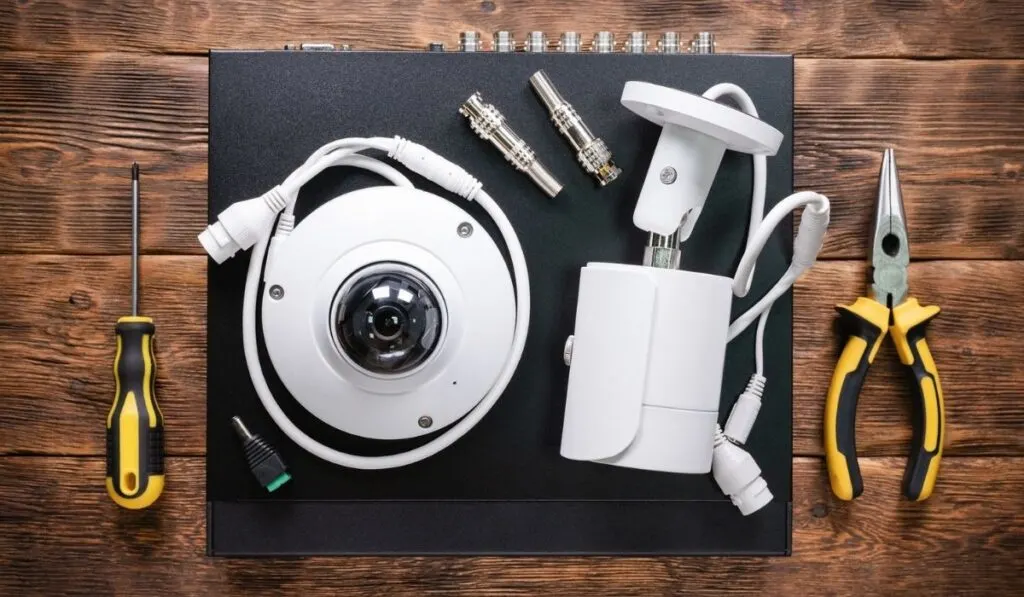When shopping around for security cameras, you may have seen both PoE and BNC models. The two of them are fairly common on the market, but BNC going out of style. PoE is the industry’s de facto standard, but that doesn’t mean they’re the only camera you’ll see on sale. So, which is the better of the two?
You can build an effective security system with either BNC or PoE cameras, but PoE is becoming the go-to standard. PoE offers higher resolution, easier install, and better compatibility with most modern security systems. BNC cameras can be converted to PoE (with some small quality limitations).
If you already own a bunch of analog BNC equipment, don’t think you need to throw it away just yet. You can still build a robust security system with them, and you could even convert them to work with a newer PoE system. But how can you do that? And more importantly, what makes PoE better anyway? Read on to learn more about BNC and PoE cameras.
How are POE and BNC Security Cameras Alike and Different?

When planning out your security system, you’ve got quite a few choices regarding what type of cameras you can use. While the modern choice is PoE, that doesn’t mean you can’t go for more “analog” style BNC security cameras. Both have pros and cons but don’t think that means there aren’t distinct advantages of each type.
Below we’re going to explore these security cameras, both PoE and BNC, and discuss what makes them different, and similar.
What Do POE and BNC Security Cameras Have in Common?
First, let’s talk about the similarities. When it comes to security cameras, regardless of whether you choose BNC or PoE you’re going to have a high-quality system.
Both are extremely reliable, which makes sense as they both are common security system connections. Of course, manufacturers ultimately wouldn’t use technology that is unreliable or ineffective.
So, for what’s common between these two camera types, they both:
- Require a hard connection. BNC for BNC and ethernet for PoE.
- Offer video feeds of fairly high quality (not the same, but more on that later)
- Often require an additional control center (DVR of NVR)
- Are relatively easy to set up and install
At the end of the day, either choice is going to provide you with the video recording qualities you’re looking for.
How are POE and BNC Security Cameras Different?

Here is where we start getting into the details. You see, BNC cameras are older technology. They’re analog, not digital. For some people, this is desirable.
For others, it’s modern tech or nothing. But that’s not to say you can’t get high-quality BNC-based cameras. In fact, you can expect to get a resolution of around 720p from BNC cameras.
PoE trumps that with even higher resolutions. But that’s part of the limitation of the analog equipment and is exactly why BNC is no longer the standard for security cameras. While you can still find them, you’ll most likely need to source used products to get all that you need for a full security system.
Cameras that utilize PoE, like this Reolink Camera Package (on Amazon), are built to work with modern networks. That means integrating them into your existing system is simple. With BNC, you’ll need a completely different system and setup. You may already have some BNC cables, also known as coaxial, but for a full system, you’ll need to find all kinds of wires to get it to work.
You’ll also get a boost in power and signal using PoE. With BNC, there are a whole lot of chances for interference. This makes it difficult to run long cables. So if you’ve got a larger area to cover, BNC might not be the best choice for you.
Are PoE Cameras Better?
While you can get a great security system from either BNC or PoE, there are some clear advantages to having a PoE-only system. The first of which is convenience. There is no denying that PoE is the modern standard, which makes sourcing equipment a little easier. Finding BNC equipment, on the other hand, can be a challenge.
But there are some other factors you’ll want to consider before making any purchases. Let’s talk about those now so you have an idea of why you might want a PoE system over an older analog one.
Easy Installation
PoE is easier to install. Getting a professional-grade system in your home doesn’t mean you need to call in the pros. With PoE, it’s possible to go through the entire installation process yourself. This can save you quite a bit on installation costs.
You’ll still need to have some handyman skills in your back pocket to do things like properly run wires, but overall you should be able to do the installation yourself.
Both dome cameras and bullet cameras need just a few simple screws to put in place. While this is the same for BNC cameras, too, the ethernet connection of PoE makes them plug-and-play.
Another factor to keep in mind is the cable run length. With PoE, you’ll have a run-length max of around 100 ft; quite a bit of space. If you need more, however, you can always use an extender, like this one (on Amazon).
Great Video Quality
You just can’t beat the outstanding video quality of PoE cameras. BNC doesn’t have the same bandwidth to keep up with modern video standards and is stuck displaying at just 720p. While that’s nothing to shake a stick at, if you’ve got a larger area to cover with your camera, it means you may be more limited.
PoE cameras, on the other hand, are constantly upping the video resolution quality. You can easily find 4K cameras, like this Reolink 4K Camera (on Amazon), and even higher resolutions like 5K.
PoE cameras even come with other features like night mode. This makes viewing both daytime and nighttime footage far easier, and also means you’ll usually have better zoom capabilities. With the higher resolution, zoomed-in images are clearer, which is great if you are in a situation where the video footage is evidence of a crime.
Integration with Other Systems
We’ve already touched on how PoE systems use your existing network to operate. But it’s much more than just that. In our constantly connected age, your network is more than just your cameras and a few computers. We’ve also got smart devices like voice assistants.
While not all camera manufacturers offer integration with smart home systems, a lot of them now do. If this is a feature you’ve got on your mind, you’re just not going to get it with BNC cameras — PoE, and wireless, offer this kind of feature.
But what can you do with this technology, anyway? Well, if you have a smart display, it means you can connect your camera to it using voice commands. It also means you will have extended control via a proprietary application, in most cases.
With analog equipment, like BNC, this just isn’t an easy task to accomplish. Sure, you may find a few workarounds, but you won’t have the same level of control as with PoE.
Can You Convert BNC to PoE?

If you’re already got some analog BNC equipment, is it possible to switch it to PoE? This is a fairly common question as many security systems can last quite a while, meaning at some point, the potential for upgrading becomes a reality. While there are naturally some limitations, it is possible with BNC equipment.
You can convert BNC to PoE. To make this work, you’re going to need an adapter, like this one (on Amazon). Installation is super easy and less expensive than adding a compatible network switch to your NVR.
This method directly converts BNC to ethernet. So keep in mind that the resolution limitations of BNC will still exist, meaning you’re still going to be stuck with 720p resolution no matter what you do. You can even use a BNC extender if the cable run length exceeds the limitations of the coaxial cable.
Power Source
Another thing to keep in mind is that you’re going to need a source of power. That means for every adapter; you’re going to need an outlet.
Since PoE uses the ethernet cable to transfer the power, this will add quite a bit of wiring to your existing setup. This shouldn’t turn you off, but it’s good to know before you start.
Additionally, you won’t have the same control over your BNC cameras as you would with PoE cameras. This includes features like zoom. It also means you’ll have a bit of a piecemeal system. If you rely on smart functions to operate some cameras, installing BNC converters means those cameras won’t be available through smartphone apps or smart home system control centers.
Really, this method is best for people who already have BNC cameras and don’t want to spend money on new PoE ones. You wouldn’t go out searching for BNC cameras just to convert them.
Do POE Cameras Slow the Internet Down?
We’ve all been victims of super slow internet. Sometimes, you’re calling for too much, and it just bogs the whole system down. Other times, it’s specific bandwidth-heavy devices that are causing the issue. So, when it comes to PoE security cameras, is this something you need to worry about?
While PoE cameras can affect your network slightly, in most cases, it’s very minimal. You may see an impact, but they will often be less than noticeable as the cameras don’t require a ton of bandwidth.
The upload and download bandwidth of your cameras is going to depend on a few factors. This includes:
- Compression codecs
- Camera resolution
- Frame rate
- Number of cameras in your system
At the end of the day, the two main factors are the number of cameras you have and the resolution. If you only have a handful of 1080p cameras, you probably don’t need to worry — assuming your internet package isn’t limiting your bandwidth too much.
If you have top-of-the-line 5K cameras and a large area to cover, it’s a different story. All those data-hungry devices will surely make an impact on your internet speed, so make sure you factor that in.
